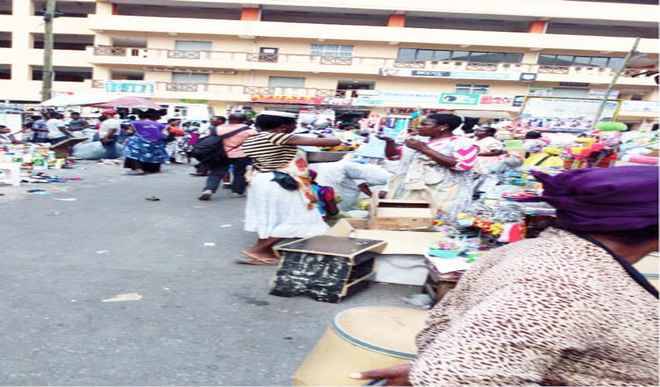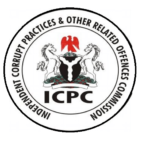
The narrow stretch of road has been taken over by people, hawkers crowding everywhere with their wares, ranging from second hand wears, phone accessories to used phones and edibles. The sidewalks are thronged with makeshift contraptions, wheelbarrows, wooden stalks, canopies and umbrellas that have been converted into mini stalls. Vendors beckon from all sides, in attempt to get you to patronize them. Scattered on opposite sides of the narrow street way are storey buildings that have been re-designed into shops. The screaming banners atop the colony of shops easily give away the type of businesses the proprietors do.
This is Tip Toe Lane, at the Kwame Nkrumah Circle, Accra’s version of Computer Village in Ikeja, Lagos. This is where Ghanaians shop for their telephones, laptops and their accessories. Tip Toe in the true sense of the word cannot be categorized as a market because it is merely a busy street side with a cluster of shopping centres. In the reckoning of Ghana’s Ministry of Trade and Industry, it’s one of the designated markets where foreigners are forbidden from doing business.
Ironically, Nigerian traders make up a significant portion of those who ply their businesses in this part of the metropolis. They are either the big tycoons – who are the importers, or wholesalers and retailers.
According to Daily Trust’s investigation, considerable numbers of shops located at Tip Toe Lane are owned by Nigerians. Because of the centrality of the area to other parts of the city, businesses thrive here. The shop owners take advantage, charging exorbitant rates to lease out their shops. The lease tenure is usually for five years.
A shop owner, who identified himself as Donald, revealed that he paid about N10 million for five years for a shop that is less than 12 Square meters. This was corroborated by another Nigerian trader, Okey, whose shop is directly on top of his.
“Ghanaians collect large sums from us for the shops, even though most of them are rented to us when they are still under construction. Aside from the fees we pay, we still have to fix up the stalls to meet our individual tastes,” he explained.
Donald is not perturbed by the undue exploitation. His pain has to do with the eviction notice issued by the Ministry of Trade and Industry. The moratorium will lapse in a matter of days and he is yet to figure the way out. His investment over the years was about to go down the drain. If the Ghanaian government should go ahead and evict traders, he will be ruined.
For him, being asked to leave the market was tantamount to being asked to leave the country because forcing him to forfeit his investments would leave him with nothing.
“You said they didn’t say Nigerians should leave their country. When you ask somebody to leave your market, what are you expecting the person to do? You want that person to become an armed robber? If that person cannot trade inside the market, where do you want that person to go? What do you want that person to do?” He asked rhetorically.
Okey did not consider Nigerians the only losers in the event the government makes good its threat to send foreigners out of the markets. He posited that even Ghanaians would suffer the impact.
According to him, he has employed three Ghanaian staff, and they will be jobless when his business is shut. The same goes for other employees that have been engaged by his colleagues.
“My Ghanaian staff will suffer if this shop is locked up. I see them as my family. The same goes with the others that work in other shops. I treat my staff nicely. I pay them well that’s why they are happy working for me. I consider them as family.
“I am begging the government of Ghana to reconsider its decision. If I have the opportunity to meet the president, I will hold on to his legs and plead with him. I have no other source of income. It is this business I use in feeding my family. I pray God touches their hearts to reconsider the decision,” he lamented.
Inside Makola International Market, Daily Trust spoke to some Nigerian traders who sell bicycle parts. A middle aged man, who identified himself as the leader of the Bicycle Spare Parts dealers, an affiliate of the Nigerian Union of Traders Associations of Ghana (NUTAG), decided to speak on the condition of anonymity.
The trader, who revealed that he has been doing business in Ghana for over two decades while expressing optimism that the current imbroglio would be resolved, said however, that he was prepared for any contingency.
He contended that it wasn’t that the situation in Ghana was rosy. They had been compelled by the difficult conditions in Nigeria to relocate to Ghana.
“It is because the situation in Nigeria is not good that is why we are here. It is not that we are enjoying this place. Since you came here have you seen anybody coming to buy goods from us? We are just managing here because half bread is better than none. But if they ask us to leave, we will do accordingly,” he opined.
Even though he sounded dejected, he expressed optimism that the current stalemate would be resolved diplomatically at the levels of both the Ghanaian and Nigerian governments.
His optimism is not misplaced because it has emerged that since the latest directive from the Ministry of Trade and Industry, there have been high-level negotiations between the two governments.
Spearheading the rounds of talks is the leadership of Nigerians in Diaspora Organizations (NIDO), the Nigerian High Commission in Ghana and the Nigerian Union of Traders Associations of Ghana (NUTAG).
The Head of Corporate Affairs of NIDO, Mr. Oscar Ugoh, who in a phone conversation confirmed that they have been holding talks with relevant Ghanaian stakeholders, was optimistic that a silver lining was underway.
Ugoh, who is also the publisher of Corporate Ghana, said his team has been having series of meetings with the Ministry of Trade and Industry, Foreign Affairs, Interior and the National Security, explaining that the crux of their argument was for the Ghanaian government to accord Nigerians preferential treatment because of ECOWAS treaty.
He argued that even though Ghana as a sovereign nation has the right to implement its sovereign laws, but it should take into account the special relationship between the two countries.
Ugoh explained further that NIDO was working tirelessly to ensure that Nigerian investments were protected in Ghana by involving the National Security.
He appealed to the authorities in Nigeria to take up the matter as a diplomatic affair, stressing that “We have over 6 million Nigerians in Ghana. It is more than the population of some states in Nigeria. The authorities in Nigeria should wake up and give us a place here. We have our people working here. So many of our people are married and have children here,” he said.
The chairman of NUTAG, Mr. Emeka Nnaji, reserved comments pending the outcome of his meeting with his constituency on Friday.




